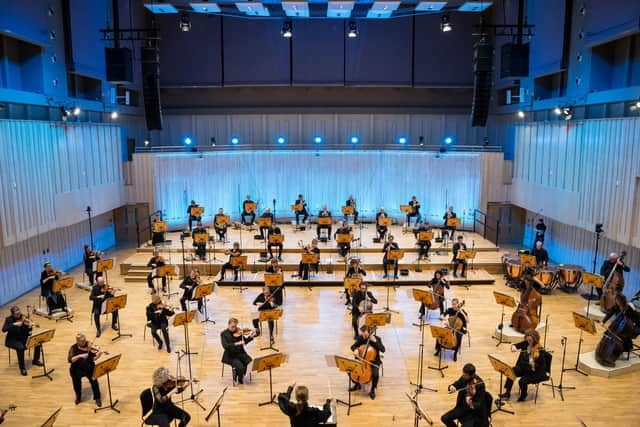Scotland's orchestras enter the digital realm, with mixed results


How are our orchestras squaring up to the new normal? Frankly, I’d rather view the current situation as temporarily abnormal, on the optimistic assumption that in the not-too-distant future musicians will be able to do what most excites them – perform in the presence of a live audience. Meantime, however, the creative challenge is to fashion a digital presence that keeps the musicians working and faithful audiences engaged.
The Royal Scottish National Orchestra is well on top of its game in that respect, with a ten-concert digital season that not only utilises superbly the adaptability of its splendid new auditorium – a gift for these socially-distanced times – but also generates income. Given the top quality production that accompanies these pre-recorded concerts, released on Friday nights and available to view online thereafter, the modest price is unquestionably good value for money.
Advertisement
Hide AdAdvertisement
Hide AdTake their latest programme, which went live on 6 November and featured Beethoven’s Piano Concerto No 3 and Sibelius’ Symphony No 7 under the talented young Norwegian conductor Tabita Berglund (*****). The sound quality is exceptionally good, coupled with sophisticated camera work that “knows the score,” so homes in on the right instruments at the right time – not always a given in some other digital concerts recently viewed.
The key attraction is the creative presentation. There’s a preparatory element, representing that informal moment in a live concert where the audience settle and the musicians drip feed on stage to warm up and tune. Except here, brief interviews with individual players, the soloist and conductor offer personal insights into what we are about to hear.
Introducing last Friday’s concert, Berglund confessed to it being her first time with this Beethoven concerto, “like exploring a new jungle.” And sure enough, what followed was fresh and dewy, void of habitual baggage. Beethoven’s triadic C minor opening theme bore a natural, self-defining assertiveness which played straight with soloist Boris Giltburg’s equally openminded approach.
Positioned within the orchestra, Giltburg employed a weeping tenderness in the central Largo, from which the final Rondo burst forth with bristling intent and an ultimate transformation to the major key that released its inevitable joyous sign off. A ten-minute encore – the final movement of Beethoven’s Sonata No 30 – was a delightful indulgence, but one you can get away with in this format.
Over in Edinburgh, the Scottish Chamber Orchestra has taken a slightly different tack with its free-to-view Thursday Chamber Music Series. Again, the film production has been classy and sophisticated – I’ve rarely seen the Queen’s Hall look so welcoming – introduced each week by a different player, but with the focus on the myriad integral ensembles from which a rich store of intimate chamber repertoire has found voice.
Their most recent programme, released on 5 November (****) threw the spotlight on early 20th century France, and music by Ravel, Debussy and Milhaud that encapsulated their common fascination for the newly emerging sounds of jazz. How different were the snug violin and cello solo sonatas respectively of Ravel and Debussy to the heated mass of Mendelssohn’s Octet that featured the previous week?
That’s the joy of this series – its infinite variations of texture and style. After the bluesy sang-froid of the Ravel (violinist Maria Włoszczowska) and the organic effusiveness of the Debussy (cellist Philip Higham), both masterfully accompanied by pianist Peter Evans, Milhaud’s piano quintet version of his ballet score La Creation du Monde was, as it should be, like a wild and decadent night at a 1920s Harlem jazz club.
Advertisement
Hide AdAdvertisement
Hide AdIronically, the BBC Scottish Symphony Orchestra is the one ensemble that hasn’t fully embraced the possibilities of online performance. Its recent live stream under conductor Sir Mark Elder – albeit a stonking programme featuring Franz Schreker’s seldom heard Chamber Symphony (***) – was a presentational disaster on the night. The orchestra so far seems to have retreated to its old Radio 3 studio existence. It needs to switch on, catch up and get its face seen.
For more on the orchestras’ digital seasons, visit www.rsno.org.uk, www.sco.org.uk and https://www.bbc.co.uk/bbcsso
A message from the Editor:
Thank you for reading this story on our website. While I have your attention, I also have an important request to make of you.
The dramatic events of 2020 are having a major impact on many of our advertisers - and consequently the revenue we receive. We are now more reliant than ever on you taking out a digital subscription to support our journalism.
To subscribe to scotsman.com and enjoy unlimited access to Scottish news and information online and on our app, visit https://www.scotsman.com/subscriptions
Joy Yates, Editorial Director